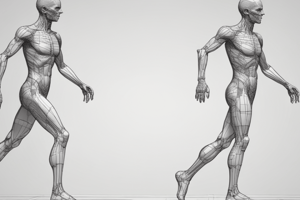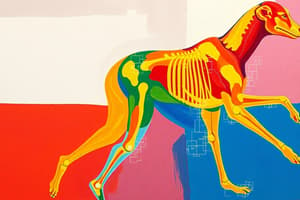Podcast
Questions and Answers
What percentage of stance and swing does the left limb exhibit during freely chosen walking speed?
What percentage of stance and swing does the left limb exhibit during freely chosen walking speed?
- 58% Stance, 42% Swing
- 70% Stance, 30% Swing
- 50% Stance, 50% Swing
- 62% Stance, 38% Swing (correct)
What characterizes running compared to walking?
What characterizes running compared to walking?
- Higher percentage of swing phase
- Presence of double-limb support
- Increased energy expenditure
- Absence of double-limb support (correct)
Which determinant of gait involves pelvic rotation?
Which determinant of gait involves pelvic rotation?
- Knee flexion in stance phase
- Pelvic rotation in the transverse plane (correct)
- Physiologic valgus of the knee
- Knee, ankle and foot interaction
What is the main purpose of the six determinants of gait?
What is the main purpose of the six determinants of gait?
What occurs to the period of double-limb support when walking at a faster pace?
What occurs to the period of double-limb support when walking at a faster pace?
What measurement indicates the average magnitude of pelvic rotation during the gait cycle?
What measurement indicates the average magnitude of pelvic rotation during the gait cycle?
Which function of the determinants of gait aims to make walking smoother and easier?
Which function of the determinants of gait aims to make walking smoother and easier?
In the fast walking speed data, what percentage of stance does the right limb have?
In the fast walking speed data, what percentage of stance does the right limb have?
What is NOT a function of the six determinants of gait?
What is NOT a function of the six determinants of gait?
What does knee flexion during the stance phase contribute to in gait analysis?
What does knee flexion during the stance phase contribute to in gait analysis?
What happens during lateral pelvic tilting in relation to the stance leg?
What happens during lateral pelvic tilting in relation to the stance leg?
What is the average magnitude of pelvic drop during gait?
What is the average magnitude of pelvic drop during gait?
What is the primary function of knee flexion during the stance phase of gait?
What is the primary function of knee flexion during the stance phase of gait?
Which movement occurs at the knee during the initial contact phase of gait?
Which movement occurs at the knee during the initial contact phase of gait?
In which phase does knee flexion reach up to 35-40 degrees?
In which phase does knee flexion reach up to 35-40 degrees?
What effect does physiological valgus have on the knee?
What effect does physiological valgus have on the knee?
What is the function of the 4th and 5th determinants of gait?
What is the function of the 4th and 5th determinants of gait?
How do external forces differ from internal forces in kinetic analysis?
How do external forces differ from internal forces in kinetic analysis?
What is the angle formed by the femoral and tibial axes at the knee joint?
What is the angle formed by the femoral and tibial axes at the knee joint?
What movement accompanies knee extension during the mid stance phase?
What movement accompanies knee extension during the mid stance phase?
Flashcards
Gait cycle duration
Gait cycle duration
The amount of time it takes to complete a single gait cycle (step) during walking.
Double-limb support
Double-limb support
A phase in walking where both feet are in contact with the ground simultaneously.
Floating
Floating
A phase in running where both feet are off the ground.
Pelvic rotation
Pelvic rotation
Signup and view all the flashcards
Lateral pelvic tilting
Lateral pelvic tilting
Signup and view all the flashcards
Knee flexion
Knee flexion
Signup and view all the flashcards
Walking vs. Running
Walking vs. Running
Signup and view all the flashcards
Center of Gravity (COG)
Center of Gravity (COG)
Signup and view all the flashcards
Six Determinants of Gait
Six Determinants of Gait
Signup and view all the flashcards
Efficiency of Gait
Efficiency of Gait
Signup and view all the flashcards
Hip Movement during Pelvic Tilt
Hip Movement during Pelvic Tilt
Signup and view all the flashcards
Knee Flexion (stance phase)
Knee Flexion (stance phase)
Signup and view all the flashcards
Knee Flexion Function
Knee Flexion Function
Signup and view all the flashcards
Knee-Ankle-Foot Interaction
Knee-Ankle-Foot Interaction
Signup and view all the flashcards
Physiological Knee Valgus
Physiological Knee Valgus
Signup and view all the flashcards
External Forces in Gait
External Forces in Gait
Signup and view all the flashcards
Internal Forces in Gait
Internal Forces in Gait
Signup and view all the flashcards
Kinetic Analysis
Kinetic Analysis
Signup and view all the flashcards
Gait Determinants
Gait Determinants
Signup and view all the flashcards
Study Notes
Walking vs Running
- Walking is distinguished from running by the presence of double-limb support.
- As walking speed increases, the double-limb support duration decreases.
- Running occurs when double-limb support disappears, with float periods where both feet are off the ground.
Gait Kinematics Analysis
- Six determinants of gait are adjustments to minimize center of gravity (COG) movement.
- Pelvic rotation in the transverse plane.
- Lateral pelvic tilting in the frontal plane.
Functions of Gait Determinants
- Pelvic Rotation: Lengthens lower extremities, minimizes COG drop.
- Lateral Pelvic Tilting: Prevents excessive COG rise.
- Knee Flexion: Absorbs shock, prevents upward COG displacement.
Knee, Ankle, and Foot Interaction
- Knee flexion and extension are associated with ankle plantar flexion and dorsiflexion during stance phases.
Physiological Valgus of the Knee
- Knee joint angle between femur and tibia is normally valgus (inward) for stability.
- This placement of the knees reduces the width of the base of support.
- Prevents excessive lateral shift of the center of gravity.
Kinetic Analysis
- Kinetic analysis examines the forces causing motion.
- External forces include gravity, inertia, and ground reaction force.
- Internal forces originate primarily from muscles and are assisted by other body components.
- Gravitational force acts downward.
- Ground reaction force (GRF) opposes gravity, is crucial for walking.
- Line of gravity is an imaginary vertical line connecting the center of gravity (COG) points on body segments.
Studying That Suits You
Use AI to generate personalized quizzes and flashcards to suit your learning preferences.




